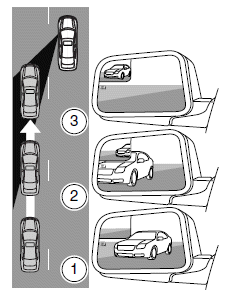Blind spot mirrors (if equipped)

Blind spot mirrors have an integrated convex spotter mirror built into the upper outboard corner of the outside mirrors. They are designed to assist the driver by increasing visibility along the side of the vehicle. For more information on your side view mirrors, refer to Exterior mirrors in the Driver Controls chapter.
Driving with blind spot mirrors
Before a lane change, check the main mirror first, then check the blind spot mirror. If no vehicles are present in the blind spot mirror and the traffic in the adjacent lane is at a safe distance, signal that you are going to change lanes. Glance over your shoulder to verify traffic is clear, and carefully change lanes.
When the approaching vehicle is at a distance, its image is small and near the inboard edge of the main mirror. As the vehicle approaches, the image becomes larger and begins to move outboard across the main mirror (1). As the vehicle approaches its image will transition from the main mirror and begin to appear in the blind spot mirror (2).
As the vehicle leaves the blind spot mirror it will transition to the driver’s peripheral field of view (3).

WARNING: Objects in the blind spot mirror are closer than they appear.
See also:
Checking automatic transmission fluid at normal operating temperature
(140°F-158°F [60°C-70°C])
Automatic transmission fluid expands when warmed. To obtain an
accurate fluid check, drive the vehicle until it is warmed up
(approximately 20 miles [30 km]) until the engine coolant gauge
indic ...
Exterior
The dedicated Lincoln design studio has developed a contemporary new look for
the 2013 MKS. Every exterior surface from the A-pillar forward is new, including
the grille, HID headlamps, front fascia ...
The better business bureau (BBB) AUTO LINE program (U.S. only)
Your satisfaction is important to Ford Motor Company and to your dealer.
If a warranty concern has not been resolved using the three-step
procedure outlined earlier in this chapter in the Getting t ...
